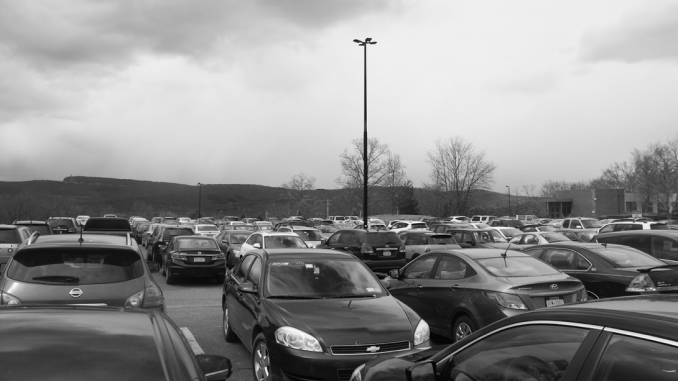
A new student parking lot is under construction to combat the congestion and chaos constricting SUNY New Paltz campus parking, according to school officials.
“We are able to provide additional parking for the community with increased safety for students to get to campus without getting into an accident,” said Facilities Design and Construction Director Michael Brennan.
The new lot will provide 240 resident-only parking spaces and will be located adjacent to the old Route 32 parking lot. According to Brennan, the school intends to install signalled crosswalks, improve pedestrian walkways and convert the old lot to an all-purpose lot. The approximately $4.5 million project began in January of this year and is projected to be completed by the Fall 2018 semester.
In the beginning of the Fall 2017 semester there were 552 residential spots, 789 commuter spots, 607 faculty/staff spots and 510 all-purpose spots. In the midst of the semester, the school eliminated 174 faculty parking spaces to make room for a new engineering building. The faculty spots were then moved to the old Route 32 spot. A temporary gravel commuter lot was established near the Health and Wellness Center and the Lenape lot became an all-purpose parking lot.
Students, like second-year commuter Sophie Friedrich, were frustrated by the inconvenience the reduction imposed on their daily trek to class.
“All the parking is super far away and there are no spots. I even got a ticket when I had bought a day pass,” Friedrich said. “People are like sharks: following people in their car to spots to get a parking spot.”
Following the removal of the faculty parking, the number of parking citations jumped from approximately 2,940 in 2017, with 1,137 appealed, to 4,528 citations in 2018, with 1,192 appealed. Parking tickets generally cost $25 per ticket, but incur a $5 fee if they are not paid off within 10 days. Students who have unpaid parking tickets have their accounts held by the school and are unable to register for classes.
Devon DeGroat, a third-year commuter, accrued several parking tickets in the month of February: two from the school and one from the village.
“I have an 8 a.m. class in van den Berg and the meters don’t start until 9 a.m. You have to pay for an extra hour so you don’t get a ticket,” DeGroat said. “How can you charge us for a pass if there are no spots?”
Even with the impending decrease in parking availability, the school raised the price of parking passes from $60 a year to $80 for the 2017-18 academic year. Assistant Vice President of Administration and Park Committee member Julieta Majak justified the increase in fees.
“There are no operating funds for the parking lots,” Majak said. “We hadn’t looked at the fees in approximately eight years. We found we weren’t bringing in enough to be a self-sustaining operation.”
It costs $25 to register a student’s parking pass alone. The school must also pay for the physical pass, staff and yearly licensing for software utilized by the parking department. Students, visitors, building contractors and non-unionized faculty and staff saw their parking rates increase last year. However, Majak does not foresee any further fee hikes in the near future.
There used to be a number of smaller parking spots in the heart of campus in years prior. The school’s 15 year master landscape plan strives to bolster the beauty of the campus. Many of these lots were removed to increase safety and increase the amount of green space. Instead of increased parking closer to the center of campus, the school intends to add more car charging stations and eco-friendly permeable parking spots.
“Parking may not be where you want it to be, but there is parking on campus. The Lenape lot is always almost completely empty,” Majak said. “We plan to pull parking away from the heart of campus to make it a more pedestrian-friendly campus.”

